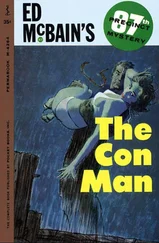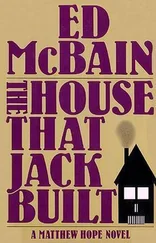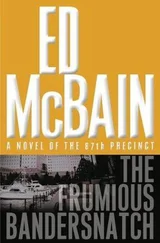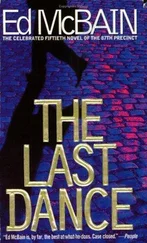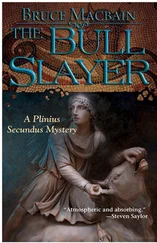Ed Mcbain - The Heckler
Здесь есть возможность читать онлайн «Ed Mcbain - The Heckler» весь текст электронной книги совершенно бесплатно (целиком полную версию без сокращений). В некоторых случаях можно слушать аудио, скачать через торрент в формате fb2 и присутствует краткое содержание. Жанр: Полицейский детектив, на английском языке. Описание произведения, (предисловие) а так же отзывы посетителей доступны на портале библиотеки ЛибКат.
- Название:The Heckler
- Автор:
- Жанр:
- Год:неизвестен
- ISBN:нет данных
- Рейтинг книги:4 / 5. Голосов: 1
-
Избранное:Добавить в избранное
- Отзывы:
-
Ваша оценка:
- 80
- 1
- 2
- 3
- 4
- 5
The Heckler: краткое содержание, описание и аннотация
Предлагаем к чтению аннотацию, описание, краткое содержание или предисловие (зависит от того, что написал сам автор книги «The Heckler»). Если вы не нашли необходимую информацию о книге — напишите в комментариях, мы постараемся отыскать её.
The Heckler — читать онлайн бесплатно полную книгу (весь текст) целиком
Ниже представлен текст книги, разбитый по страницам. Система сохранения места последней прочитанной страницы, позволяет с удобством читать онлайн бесплатно книгу «The Heckler», без необходимости каждый раз заново искать на чём Вы остановились. Поставьте закладку, и сможете в любой момент перейти на страницу, на которой закончили чтение.
Интервал:
Закладка:
The game was five-card stud. Two of the players had dropped out on the third card, leaving only the deaf man and Chuck in the game. Looking across at the deaf man’s hand, Chuck saw the three exposed cards: a jack of spades, a queen of clubs and a king of diamonds. He was reasonably certain that the hole card was either a ten or an ace, more probably a ten.
Chuck’s reasoning, to himself, seemed sound. He was sitting with a pair of aces and a six of clubs exposed. His hole card was a third ace. His three-of-a-kind had the deaf man’s possible straight beat. If the deaf man’s hole card was a ten, he was sitting with a four-card straight, both ends of which were open. The chances of filling it seemed pretty slim. If his hole card was the ace, his straight was open on only one end, and the chances of filling it were narrower. Besides, there was always the possibility that Chuck would catch either a full house or four-of-a-kind on that last card. His bet seemed like a safe one.
“Aces bet a hundred,” he said.
“Raise a hundred,” the deaf man answered, and Chuck had his first tremor of anxiety.
“On what?” he asked. “All I see is three cards to a straight.”
“If you looked more closely, you’d see a winning hand.”
Chuck nodded briefly, not in agreement with the deaf man, but with an inner conviction of his own. “Raise you a hundred,” he said.
“That’s fair,” the deaf man said. “And once again.”
Chuck studied the deaf man’s hand once more. Three cards to a straight showing. The fourth card to the straight obviously in the hole. Whether it was open on one end or both, it still needed a fifth card.
“ And a hundred,” Chuck said.
“Be careful now,” the deaf man advised. “I’ll just call.”
He put his chips into the pot. Chuck dealt the next card. It was the ten of hearts.
“There’s your goddam straight,” he said.
He dealt his own card. The four of diamonds.
“Aces still bet,” the deaf man said.
“I check,” Chuck said.
“I’ll bet a hundred,” the deaf man said, and Chuck’s face fell.
“Yeah,” he answered. “I’ll see you.”
The deaf man turned over his hole card. Sure enough, it was the ace.
“Straight to the ace,” he said. “I think that beats your three aces.”
“How’d you know I had three aces?” Chuck asked, watching the deaf man pull in his winnings.
“Only from the force of your betting. I don’t think you’d have bet so heavily with two pair. So I assumed you already had your third ace.”
“And you raised three aces? On the strength of a possible straight?”
“On the strength of percentages, Chuck,” the deaf man said, stacking his chips into a neat pile. “On the strength of percentages.”
“Some percentages,” Chuck said. “Luck, that’s all. Dumb luck.”
“No, not quite. I was sitting with four cards to a one-ended straight: the jack, queen, king and ace. In order to make my straight, I needed a ten—any ten. And this was the only possible way of improving my hand to beat your three aces. I had to catch that ten. If not, if for example I simply paired one of my cards, I couldn’t possibly beat you. Am I right? So what were my chances of completing the straight? My chances against making it were nine to one, Chuck.”
“Well, those seem like pretty damn steep odds to me.”
“Do they? Consider the fact that no tens had appeared at any time during the game. Of course, either you—or our friends before they dropped out—could have been holding tens in the hole. But I knew you had an ace in the hole, and I took a chance on our friends.”
“The odds were still too steep. You should have dropped out.”
“But then I’d have lost, wouldn’t I? And your own odds against improving your hand were even steeper.”
“How could they be? I had you beat to begin with! I had three aces!”
“Yes, but how could you improve them? In one of two ways. Either by catching a fourth ace or by catching another six to give you a full house. I knew you couldn’t catch the fourth ace because I was sitting with it in the hole. In any case, the odds on catching it, even if I hadn’t been holding it, would have been thirty-nine to one. Considerably higher than nine to one, don’t you think?”
“What about the possibility of a full house? I could have caught that other six.”
“True, you could have. The odds against it, though, were fourteen and two thirds to one. Which, again, is higher than the nine to one odds I was bucking. And, weighted against this was the fact that our two friends were both showing sixes when they dropped out. This means there was only one six left in the deck, and it further means that the odds on catching that last six were essentially the same as they’d be for catching the fourth ace—thirty-nine to one. Get it, Chuck? My odds were nine to one. Yours were thirty-nine to one.”
“You’re forgetting something, aren’t you?”
“I never forget anything,” the deaf man said.
“You’re forgetting that neither of us could have improved our hands. And if neither of us improved, I’d have won. Three aces beats an incompleted straight.”
“That’s true. But it’s not something I forgot. It was simply a calculated risk. Remember, Chuck, that your pair of aces didn’t turn up until the fourth card had been dealt. If your first two exposed cards had been aces, I’d have dropped out immediately. Up to that point, we were both on equal footing more or less. You had an ace and a six showing on the board. I had an ace in the hole, and a king and queen showing on the board. My hand seemed just about as strong as yours. I suspected you had a pair of aces but, considering my own ace in the hole, I thought you might be bluffing a strong bet on a pair of sixes. And any pair I caught would have beat those. I think I played the hand correctly.”
“I think it was luck,” Chuck maintained.
“Perhaps.” The deaf man smiled. “But I won, didn’t I?”
“Sure. And since you won, you can come on real strong about how you figured it all out beforehand.”
“But I did, Chuck.”
“You only say you did. If you’d have lost, it’d be a different story. You’d have been making excuses all over the lot to explain away your mistakes.”
“Hardly,” the deaf man said. “I am not a person who admits to mistakes. The word mistake isn’t even in my vocabulary.
“No? Then what do you call it?”
“Deviation. Truth is a constant, Chuck. It is only the observation of truth which is a variable. The magnitude of error depends on the difference between the unchanging truth and the faithfulness of the observation. And so error can only be defined as deviation, not mistake.”
“Bullshit,” Chuck said, and the other men around the table laughed.
“Precisely,” the deaf man said, laughing along with them. “Bullshit. Error is simply the amount of bullshit attached to any true observation. Do you want to deal, Rafe?”
The tall thin man on Chuck’s left raised his gold-rimmed spectacles and wiped the tears from his eyes. He took the cards and began shuffling them.
“One thing I’ve got to say is that this is gonna be the goddammedest caper there ever was.” He shoved the deck at Chuck. “You want to cut?”
“What’s the use?” Chuck said petulantly. “Run them.”
The man sitting opposite Rafe said, “What’s the game?” He put the question tentatively because he was a newcomer to the group, and not yet too sure of his standing. Nor was he yet too certain as to exactly who his predecessor had been or why he’d been dropped from the quartet. He possessed only one quality which could be considered useful to the group, and he had stopped considering that a quality some ten years ago. This quality was the making of bombs. Bombs, that is. You know, bombs. The old man sitting at the table with the other three had been quite adept at fashioning lethal exploding devices. He had lent his talents at one time to a certain foreign power and had spent a good many years in prison regretting this peccadillo, but his early political affiliations had not been questioned by the deaf man when he’d been hired. The deaf man was content to know he could still put together a bomb if called upon to do so. He was particularly interested in learning that the old man could put together incendiary bombs as well as the exploding garden variety. His versatility seemed to please the deaf man immensely. Pop couldn’t have cared less either way. All he knew was that he was being hired to do a job—and as far as he could tell, the only qualification he possessed for that job was his ability to make bombs.
Читать дальшеИнтервал:
Закладка:
Похожие книги на «The Heckler»
Представляем Вашему вниманию похожие книги на «The Heckler» списком для выбора. Мы отобрали схожую по названию и смыслу литературу в надежде предоставить читателям больше вариантов отыскать новые, интересные, ещё непрочитанные произведения.
Обсуждение, отзывы о книге «The Heckler» и просто собственные мнения читателей. Оставьте ваши комментарии, напишите, что Вы думаете о произведении, его смысле или главных героях. Укажите что конкретно понравилось, а что нет, и почему Вы так считаете.



